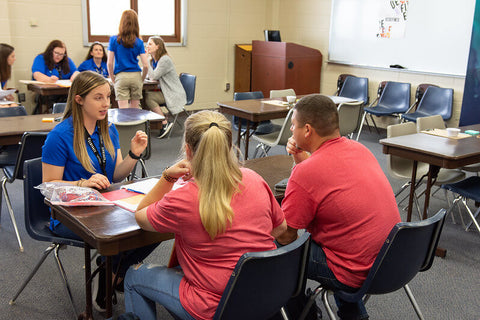
5 Reasons Teenagers Struggle To Develop Good Spiritual Habits
We all want to see our students mature in their faith habits. We want them to have a more vibrant prayer life. We want them to be more consistent in spending time with God through Scripture reading. We want to see them embrace a lifestyle of worship. And these are good things to want. But recently, I was thinking about why this can be a struggle. Why is it so difficult for some of our students to grow in their pursuit of spiritual disciples?
As we lead our teenagers in developing good spiritual habits, I think it's important for us to realize the challenges they, and we, are up against.
Here are a few that came to my mind:
1. Time
It kills me when I see how busy or students are. As I get older, it seems like the students I work with are juggling responsibilities way beyond what just a few years ago was considered normative. Sports are the main culprit, it seems. But between the myriad of extra-curricular activities and the hours of homework, our kids have each night, carving out time to spend in meaningful prayer and study of Scripture is not easy. It's also not as impossible as some of them make it out to be (can you sense my well-meaning frustration???). But, it is a very real challenge.
2. Disconnect With Scripture
One of the biggest obstacles for students (especially younger ones) is simply the normal challenge of reading Scripture. A while back, I asked one of my small group students how his personal time reading the Bible had been going. He was using a devotional book that had him read Psalm 104. He said that he was simply struggling with applying all the language to his life.

I looked at the psalm: "There the birds make their nests; the stork has its home in the junipers. The high mountains belong to the wild goats; the crags are a refuge for the hyrax." I told him that I could totally understand how he got a little hung up. (It gave me a great chance to remind him that one of the reasons we meet in our small groups is to work through questions we have about what we read in our personal times of devotions)
The Bible is challenging for students and adults alike. Part of our role as leaders is to help students understand and apply Scripture to their lives. It's vital in helping develop good spiritual habits.
3. Cultural Clash
Let's face it: the type of spiritual disciplines we try to instill in our students (prayer, Scripture reading, evangelism, service, etc.) runs pretty counter to the culture teenagers find themselves in. These types of practices are very counter-cultural to the world they find themselves living in. Helping them value these practices is the first step, even before we lead them to develop these spiritual habits.
5. Partnering With Parents Is A Must, But Can Be Hit Or Miss
We have to work together with parents to lead students to develop spiritual disciplines, especially with younger students. However, there are a ton of parents who care about their teenager's spiritual habits but either
1.Do not feel equipped to shepherd their children
or
2. Are just really, really busy.
I tend to shake my head at these parents (even as I sometimes see myself in these indictments).

But, I need to be more understanding. There are parents in your youth ministry with two or three children in high school. These parents have careers. They also have one child in the band, one in show choir, and one playing football. By the time they chauffeur and organize and provide meals and make sure homework is done, all after working a long day, they are whipped. And sometimes they don't have the energy to spend making sure their children have spent meaningful time in Scripture on a particular day.
Is this ideal? No. But it's reality in many cases. For several reasons, we don't always get to benefit from the kind of teamwork we'd like to see when it comes to helping develop good spiritual habits in the students we lead.
Read: The Influence of Parents on Teenager's Spiritual Growth
6. Our Own Sin-Nature
Let's not forget that in our hearts, our students and ourselves have a default lean toward selfishness and rebellion. We don't always seek God. We oftentimes seek our own comfort. Left to their own designs, our students would rather watch The Voice, or play Call of Duty, or read about our favorite team on Rivals.com than commune with God in prayer and Bible Study. It's why it's called spiritual discipline. It takes effort. And as we work with students who are young in their faith, we will encounter this even more.
So, what can we do?
Keep. plugging. away.
I want to see my students grow in Christ. I want to see your students do the same. And though I want it now, I know it will come. I trust in the Holy Spirit and His ability to empower all of us toward spiritual maturity. So, encourage your students to hang in there. And you do the same. Recognize the challenges, but don't be overwhelmed by them, and don't use them as an excuse.




Leave a comment